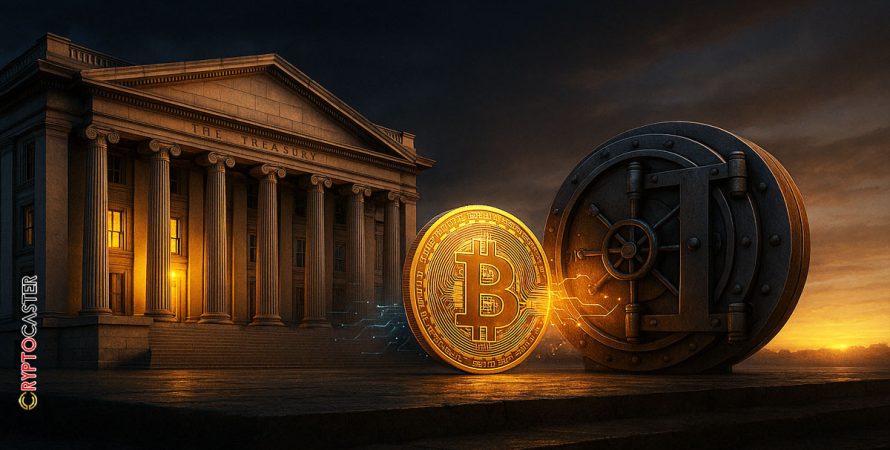On August 7, 2025, President Donald Trump signed the “Guaranteeing Fair Banking for All Americans” executive order — a sweeping directive aimed at ending the practice of “debanking,” where financial institutions close or deny accounts based on political, religious, or ideological views.
Stay in the know on crypto by frequently visiting Crypto News Today
For years, crypto firms have quietly complained about the same treatment, facing abrupt account closures and payment processor bans without clear explanation. Now, the White House says that era could be ending — and that violators could face steep fines and federal enforcement.
What the Executive Order Says
The order eliminates “reputational risk” as a valid reason to deny banking services, a catch-all term many institutions have used to avoid serving politically sensitive industries — from firearms dealers to blockchain startups.
Key directives include:
- Federal banking regulators have 120–180 days to review past and current debanking actions.
- The Treasury Secretary must develop a long-term strategy, potentially recommending legislative codification.
- The Small Business Administration is ordered to reengage with entities previously denied banking due to non-financial criteria.
- Agencies may issue fines, consent decrees, or refer cases to the Justice Department for prosecution.
CryptoCaster Quick Check:
Why This Matters for Crypto
The crypto sector has long operated in a gray zone when it comes to banking access. Even fully licensed exchanges and compliant blockchain service providers have faced sudden account terminations. This new order could:
- Open doors for more stable fiat-crypto relationships.
- Reduce reliance on offshore banking partners.
- Lower onboarding friction for crypto startups seeking U.S. banking access.
For decentralized finance (DeFi) operators and NFT marketplaces, the shift could be transformative — but only if the EO is enforced with real consequences.
Supporters See a Turning Point
Advocates say this is a long-overdue correction to an unaccountable practice. Congressman Andy Barr (R-KY) has already introduced legislation to codify the order, arguing it will protect both small businesses and politically disfavored sectors like cryptocurrency.
Crypto policy groups are cautiously optimistic. “Access to banking shouldn’t be a political decision,” one blockchain trade association stated, calling the EO “a potential watershed moment” for the industry.
Critics Question the Follow-Through
Skeptics note that without legislative permanence, a future administration could reverse the order. They also argue that enforcement will depend heavily on the will — and bandwidth — of federal regulators.
Some banking advocates warn that limiting “reputational risk” assessments could expose banks to money laundering and fraud risks. Crypto critics have seized on this point, suggesting the order might open the door to “unvetted” players entering the U.S. banking system.
Next Steps to Watch
- Regulatory Compliance Reviews: Expect agency updates by early 2026.
- Legal Codification: Barr’s proposed bill could make the policy permanent.
- Crypto Industry Action: Exchanges, wallets, and Web3 startups may reapply for accounts previously denied.
If enforced robustly, the order could fundamentally reshape how crypto integrates into the traditional banking system. If not, it risks becoming another political talking point in an already charged regulatory climate.
Bottom Line:
Trump’s executive order is both a warning shot to banks and a possible lifeline to industries sidelined by “reputational” discrimination. For the crypto sector, the next 180 days could determine whether this is the breakthrough they’ve been waiting for — or just another headline.
If this article brought you clarity, insight, or value—support the work that made it possible.
At CryptoCaster, we report on Web3, crypto markets, and institutional finance with no billionaire owners, no shareholders, and no hidden agenda. While mainstream media bends toward Elon Musk, BlackRock, and JPMorgan narratives, we stay focused on what matters: truth, transparency, and the public interest.
We don’t just cover the headlines—we investigate the power structures behind them. From FTX and Ripple to the quiet push for CBDCs, we bring fearless reporting that isn’t filtered by corporate interests.
CryptoCaster is 100% paywall-free. Always has been. To keep it that way, we depend on readers like you.
If you believe independent crypto journalism matters, please contribute—starting at just $1 in Bitcoin or Ether. Wallet addresses are below.
Your support keeps us free, bold, and accountable to no one but you.
Thank you,
Kristin Steinbeck
Editor, CryptoCaster
Support CryptoCaster: The Unfolding of Money
At CryptoCaster.world, we’re dedicated to bold journalism, sharp insights, and fearless commentary across blockchain, Web3, and crypto markets. Your **Bitcoin contributions** help us stay independent and continue delivering signal over noise.
🚨 CryptoCaster does not offer investment advice. Always DYOR—volatility is real, and risk tolerance matters.
Support our mission. Contribute BTC today.
🔗 Bitcoin Address:
3NM7AAdxxaJ7jUhZ2nyfgcheWkrquvCzRm
Thank you for backing our journalistic lens as we chronicle the Unfolding of Money — a saga still being written in real time.![]()
CRYPTOCASTER HEATMAP







